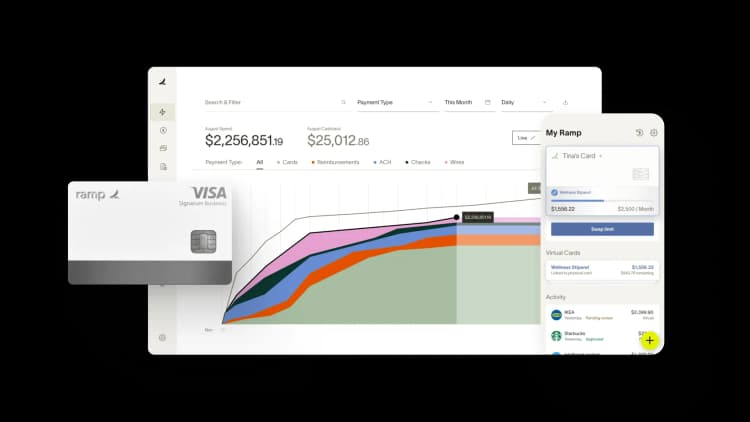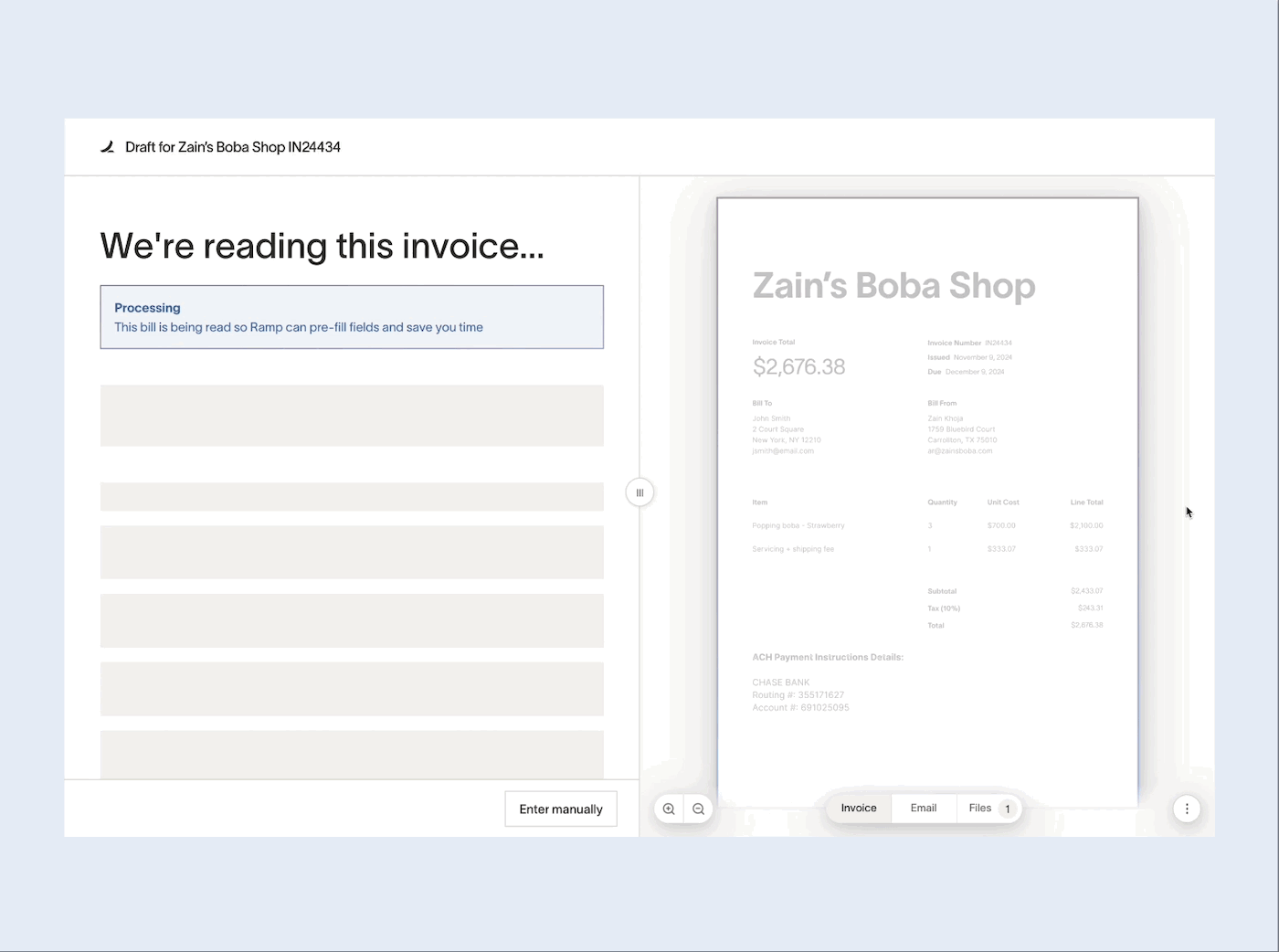3 ways to distinguish AI from automation in financial technology

- AI vs. automation in fintech
- 1. AI can analyze data by itself
- 2. AI can develop recommendations
- 3. AI can continuously improve itself
- What this means for the future of finance
- How Ramp uses true AI to transform your finance operations
- Put AI to work for your finance team

AI vs. automation in fintech
Artificial intelligence (AI) and automation both produce similar benefits in accounting, but they’re distinct terms—and they’re often incorrectly used interchangeably, especially within the context of financial technology.
Automation is like a train with a conductor chugging along a single track. It can move fast in a fixed direction, doing the same thing over and over again.
AI is like a self-driving vehicle that can drive in any direction it wants. It doesn’t need a person at the steering wheel to get where it needs to go.
In practice, this means AI can digest a problem or process and find a solution without human intervention, while automation is the byproduct of a human both identifying a process and creating the technological solution to perform the same process more efficiently.
I often see financial technology companies create tools that use automation but market them as tools that “leverage AI.” Using the AI buzzword can be very effective for selling unwary customers on a higher price tag regardless of whether AI is actually a part of the product.
Let’s take a modern bill pay system as an example. I’ll illustrate three characteristics of AI and how it might be distinguished from automation so you can better evaluate new technology for your own organization.
1. AI can analyze data by itself
Bill pay software has come a long way in recent years. It’s a great example of a system that can include features of both automation and AI.
Traditionally, before modern bill pay tools, a physical bill would be mailed to a customer’s office. One of the customer’s employees would then open the mail, read what the bill is for, input the bill into an accounting system, and schedule payment.
Today, vendors can send bills electronically, immediately dropping them directly into a customer’s bill pay system. This system might use various subfields of AI called machine learning and natural language processing to analyze the contents of unique bills within seconds, before any human intervention.
AI can identify critical pieces of information like due date, amount, and vendor name all on its own. This technology can save accounting staff countless hours of reading through individual documents. Studies confirm average cost savings between 60–80% compared to legacy paper-based AP, and productivity has been shown to increase by up to 90%.

AI can process an invoice and pull out key details without any human intervention.
In contrast, automation on its own does nothing to actually analyze data. Automation is simply the repetition of a predefined task, which, in turn, can allow employees to complete these tasks much quicker.
In our bill pay system example, if all bills were formatted the same, someone could create an automated tool that extracts the vendor name, date, amount, and so on as long as those bits of information were in the exact same location on each document every time.
If the date is in the top right corner on every bill, automation would expect every bill to have the date in the top right corner. If a bill arrived and the date was in the bottom left corner, simple automation would fail, resulting in errors and requiring human intervention.
2. AI can develop recommendations
Automation does not arrive at conclusions or develop solutions on its own. Instead, automation speeds up the interaction between two points along a predefined path.
For example, let’s say the bill pay software doesn’t have AI capabilities and is not integrated with the company’s accounting system. An accountant would have to read and categorize every bill manually within the billing system. Automation would be beneficial in this example because it can transfer the data of categorized bills from the bill pay software to the accounting system.
Automation still saves the company time and money in this scenario. The use of AI, however, would improve the workflow exponentially. For example, after an AI system processes and analyzes the contents of a bill, it can often suggest how each bill should be classified—before a human ever lays eyes on the document.
AI functionality can also catch details that its human counterparts might miss. This reduces errors within a company’s data and ultimately saves the company time and money. Modern bill pay systems can now immediately recognize and suggest helpful ideas, such as, “This is a bill for inventory,” or, “This is a duplicate bill.”
Some estimates from past APQC Open Standards Benchmarking® Accounts Payable surveys reveal that duplicate payments represent .8%–2% of total spend or disbursements, making these AI features especially attractive when you consider the potential cost savings.
3. AI can continuously improve itself
Another benefit of AI and machine learning models is that they can improve themselves automatically. Systems that incorporate AI capabilities contain a self-educating feature that continuously looks for the information it needs until it succeeds. Every new problem that arises can teach the AI system to be more efficient next time.
Think about the example we covered previously. As the AI-powered bill pay system finds dates in new and different locations around documents, it steadily builds a memory bank to draw on.
It will first search the locations of previously found dates before searching new locations around the document. When a new vendor sends its first bill, the bill pay software will have to search the document until it finds the date.
However, the next time that vendor sends a bill to the company, the AI will already know where to find it. Over time, as higher volumes of data pass through the system, the software will develop shorter processing times and operate more efficiently.
What this means for the future of finance
Accounting technology is improving, making historically manual processes like accounts payable more efficient. Successful companies understand they can create more value and reduce overhead by investing in analysts and higher-level accounting managers capable of leveraging AI and automation tools into more strategic and higher-value roles.
These new “accounting strategists” can now spend more of their time driving profitability rather than crunching numbers with a calculator. By eliminating historically manual processes, you may even rethink the structure of your accounting team altogether.
Instead of one accountant managing accounts payable and another managing accounts receivable, you could have a single accountant manage both. Alternatively, you could redeploy personnel to negotiate payment terms with suppliers and customers, or analyze current manufacturing contracts to find cost savings on raw materials.
Peter Drucker, an expert in management science, economics, and policy, wrote extensively about this concept in the mid-20th century. He defined what he called “knowledge workers” and accurately predicted that more and more workers would be paid to think for a living rather than perform manual work.
There are clear parallels between Drucker’s predictions and today’s shift toward digital automation and AI. Both technologies allow accountants to decrease their time spent on repetitive manual tasks and shift their focus to knowledge work—developing strategies and processes that drive growth.
How Ramp uses true AI to transform your finance operations
Many finance teams struggle to differentiate between basic automation and genuine AI when evaluating financial technology. You've probably encountered tools that claim to use "AI" but simply follow preset rules—like automatically categorizing transactions based on merchant names or sending alerts when spending exceeds a threshold. While these automated workflows save time, they can't adapt to your unique business context or learn from your team's decisions over time.
Ramp Intelligence goes beyond simple if-then automation to deliver financial insights that evolve with your business. Our expense management system uses machine learning to analyze your historical spending patterns and automatically suggests the most accurate expense categories for new transactions—not just based on merchant names, but by understanding the context of your purchases, timing, and team behaviors. When your marketing team starts using a new vendor for digital advertising, Ramp's AI recognizes the shift and adapts its categorization suggestions accordingly, without requiring manual rule updates.
The platform's intelligent receipt matching demonstrates another key difference between AI and basic automation. Rather than simply matching receipts to transactions based on amounts and dates, Ramp's AI extracts and interprets complex receipt data, understanding variations in formatting, handling multiple currencies, and even flagging potential compliance issues based on your company's specific policies. This contextual understanding means fewer errors and less manual review time for your finance team.
Ramp's AI also powers proactive spend insights that help you identify cost-saving opportunities before they become problems. By analyzing spending trends across similar companies and your own historical data, the platform surfaces actionable recommendations—like identifying duplicate software subscriptions or suggesting more cost-effective vendors—that basic automation could never provide.
Put AI to work for your finance team
Ramp's AI can transform your entire financial workflow. The platform automates complex bill pay processes, from invoice verification through payment scheduling, while building custom approval chains that match your organization's structure.
Ramp Intelligence can even analyze vendor contracts against market benchmarks, alerting you when you're overpaying for services. By combining these automated workflows with genuine machine learning, Ramp frees your team from repetitive tasks so you can focus on strategic financial decisions.
Ready to learn more? Try an interactive demo and see why companies that use Ramp save an average of 5% a year across all spending.

Don't miss these
“Ramp gives us one structured intake, one set of guardrails, and clean data end‑to‑end— that’s how we save 20 hours/month and buy back days at close.”
David Eckstein
CFO, Vanta

“Ramp is the only vendor that can service all of our employees across the globe in one unified system. They handle multiple currencies seamlessly, integrate with all of our accounting systems, and thanks to their customizable card and policy controls, we're compliant worldwide. ”
Brandon Zell
Chief Accounting Officer, Notion

“When our teams need something, they usually need it right away. The more time we can save doing all those tedious tasks, the more time we can dedicate to supporting our student-athletes.”
Sarah Harris
Secretary, The University of Tennessee Athletics Foundation, Inc.

“Ramp had everything we were looking for, and even things we weren't looking for. The policy aspects, that's something I never even dreamed of that a purchasing card program could handle.”
Doug Volesky
Director of Finance, City of Mount Vernon

“Switching from Brex to Ramp wasn't just a platform swap—it was a strategic upgrade that aligned with our mission to be agile, efficient, and financially savvy.”
Lily Liu
CEO, Piñata

“With Ramp, everything lives in one place. You can click into a vendor and see every transaction, invoice, and contract. That didn't exist in Zip. It's made approvals much faster because decision-makers aren't chasing down information—they have it all at their fingertips.”
Ryan Williams
Manager, Contract and Vendor Management, Advisor360°

“The ability to create flexible parameters, such as allowing bookings up to 25% above market rate, has been really good for us. Plus, having all the information within the same platform is really valuable.”
Caroline Hill
Assistant Controller, Sana Benefits

“More vendors are allowing for discounts now, because they're seeing the quick payment. That started with Ramp—getting everyone paid on time. We'll get a 1-2% discount for paying early. That doesn't sound like a lot, but when you're dealing with hundreds of millions of dollars, it does add up.”
James Hardy
CFO, SAM Construction Group






